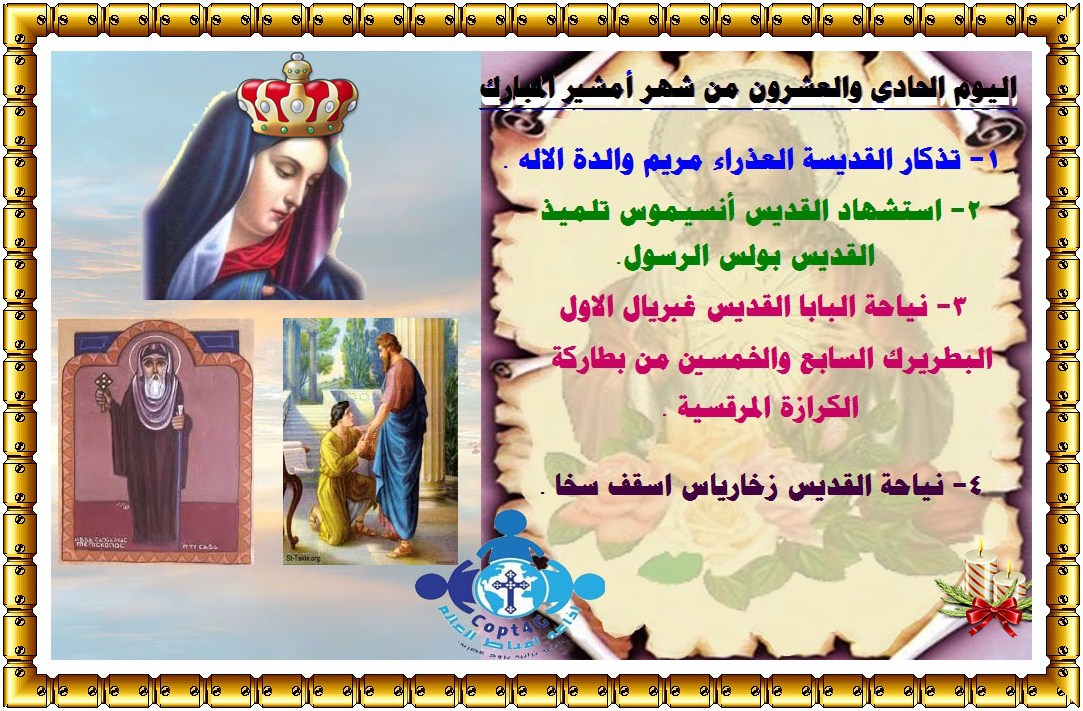
It's all very simple. God is love. He is love's origin, example, and architect. I love because he loved me first. I know how to love because he has demonstrated it. I can love because he made me in his likeness and to share his character. He is the fountain, the motivation, and the pinnacle of love. I love because he does, first, last, and always.

Day 21 of the Blessed Coptic Month of Amshir, may God make it always received, year after year, with reassurance and tranquility, while our sins after forgiven by the tender mercies of our God my fathers and brothers.
Amen.
The Twenty-First Day of the Blessed Month of Amshir
Commemoration of the Virgin St.Mary
![]()
We celebrate on this day the commemoration of the pure Lady St. Mary the Virgin, the Mother of God, the Word, through whom was the salvation of Adam and his offspring.
May her intercession be for us all. Amen.
Martyrdom of St.Onesimus, the Disciple of St.Paul
On this day also St. Onesimus, the disciple of St. Paul, was martyred. This saint was a slave for a man from Rome called Philemon who believed at the hands of St.Paul, when he heard his preaching in Rome. Philemon departed from Rome on a business trip and took with him Onesimus among others of his servants. There the devil enticed Onesimus, so he stole money from his master and fled to Rome. According to the Divine Will, Onesimus attended the preaching of St. Paul, which he kept in his heart. He believed at the hand of St. Paul and his heart was filled with the grace and the fear of God. He remembered what he stole from his master and from others and since he did not have anything left from the stolen money to return to its rightful owners, he was sorrowful and told St.Paul about that. St. Paul comforted him and wrote an epistle to Onesimus' master, Philemon, informing him in it, that Onesimus became a follower of Christ saying, "I appeal to you for my son Onesimus, whom I have begotten while in my chains." St. Paul asked him to treat him gently and not to mind what he did but to consider what he lost as owed by the apostle. When Onesimus took the epistle to his master Philemon, he was pleased by his faith and repentance and treated him as the apostle commanded. Furthermore, he offered him more money but St. Onesimus refused saying, "I am rich with Christ." Then he bid Philemon farewell and returned to Rome. St. Onesimus continued to serve St. Paul until his martyrdom and deserved to be ordained a priest. After the martyrdom of St. Paul, the governor of Rome seized him and exiled him to one of the islands. He remained there preaching and baptizing the people of the island. When the governor came to the island, he found him guiding the people to the belief in the Lord Christ. He was beaten severely and his legs were broken. He departed in peace.
May His prayers be with us. Amen.
Departure of St.Gabriel, the Fifty-Seventh Pope of Alexandria
On this day also of the year 911 A.D., the great father St. Gabriel, 57th Pope of Alexandria, departed. This saint became a monk at a young age, practicing many worships. He loved solitary life and wept much while praying, asking the Lord to save him from the snares of the devil. When Pope Mikhael, 56th Pope, departed, they chose this father to be the Pope in his place. He was ordained in the year 900 A.D. against his will. He cared for the church affairs well, and the duties of the patriarchate did not prevent him from his worship and asceticism. He spent most of his days in the wilderness and whenever he had some affairs to take care of in Cairo or Alexandria, he would leave and then return back to the wilderness. He fought against the flesh and the devil by increasing fasting, watching, prayers and humility. He used to wake up in the night, put on a ragged garment, take a metal shovel and go around the bathrooms of the monks' cells, washing and cleaning them. He did the same for many years until the Lord looked upon his humility and humble heart, so He relieved his pains and gave him the grace of victory over sin and the body. This father was a worshipper, fighter and a preacher for 11 years, then he departed in peace.
May His prayers be with us. Amen.
Departure of St.Zacharias, Bishop of Sakha
On this day also St. Zacharias, Bishop of Sakha, departed. He was the son of a scribe called John who left his job and was chosen to be a priest. His son Zacharias was raised on studying literary and religious subjects. When he grew up, El-Wazeer appointed him as a scribe in his court. Afterward he agreed with a friend called Ptolemy who was the prefect of the town of Sakha, to leave their work and go to the wilderness to become monks. That coincided with the coming of a monk from the monastery of St. John the Short, so they decided to go with him to the monastery. When the ruler (El-Wazeer) knew about that, he prevented them from going to the monastery. A few days later, they saw a vision as if someone was asking them, "Why did you not fulfill your vow?" Immediately, they left in secret, walking to the wilderness, without knowing their way. They met on their way, by the will of God, a monk who took them to the monastery of St. John the Short (Colobos). When their friends knew about that, they took a letter from the Governor to bring them back, but the Lord defeated their counsel. As for Zacharias and his friend, they put on the garb of the monks and exerted themselves in many worships. That was during the time of the saints Abba Gawargah and Abba Abraham who were the best guides for them. When the Bishop of Sakha departed, the people wrote to the father, the Patriarch, asking for Zacharias to be their bishop. The Patriarch brought him and ordained him against his will. At the time of the ordination, when the Pope was about to put his hands on Zacharias' head, a light shined in the church and his face appeared as a bright star. When he arrived to his diocese, the people rejoiced and went out to meet him with great honor. The church was illumined with his teachings. St. Zacharias was eloquent and filled with grace and he wrote many articles, sermons and discourses. He stayed on his chair for 30 years, then departed in peace.
May His prayers be with us and Glory be to our God forever. Amen.

The third [revelation] is that our Lord God, almighty wisdom, all love, just as truly as [God] has made everything that is, so truly [God] does and brings about all that is done . . . we are securely protected through love, in joy and sorrow, by the goodness of God. . . . All shall be well, and all shall be well, and all manner of things shall be well. —Julian of Norwich [1]
For Pierre Teilhard de Chardin (1881–1955), a French Jesuit priest who trained as a paleontologist and geologist, love is “the very physical structure of the Universe.” [2] That is a very daring statement, especially for a scientist to make. Yet for Teilhard, gravity, atomic bonding, orbits, cycles, photosynthesis, ecosystems, force fields, electromagnetic fields, sexuality, human friendship, animal instinct, and evolution all reveal an energy that is attracting all things and beings to one another, in a movement toward ever greater complexity and diversity—and yet ironically also toward unification at ever deeper levels. This energy is quite simply love under many different forms. (You can use another word if it works better for you.)
Love, the attraction of all things toward all things, is a universal language and underlying energy that keeps showing itself despite our best efforts to resist it. It is so simple that it is hard to teach, yet we all know love when we see it. After all, there is not a Native, Hindu, Buddhist, Jewish, Islamic, or Christian way of loving. There is not a Methodist, Lutheran, or Orthodox way of running a soup kitchen. There is not a gay or straight way of being faithful, nor a Black or Caucasian way of hoping. We all know positive flow when we see it, and we all recognize resistance and coldness when we feel it. All the rest are mere labels.
When we are truly “in love,” we move out of our small, individual selves to unite with another, whether in companionship, friendship, marriage, or any other trustful relationship. Have you ever deliberately befriended a person standing alone at a party? Perhaps someone who was in no way attractive to you or with whom you shared no common interests? That would be a small but real example of divine love flowing. Don’t dismiss it as insignificant. That is how the flow starts, even if the encounter doesn’t change anyone’s life on the spot. To move beyond our small-minded uniformity, we have to extend ourselves outward, which our egos always find a threat, because it means giving up our separation, superiority, and control.
Christena Cleveland recognizes that so much is lost when we refuse to cross the “borders” that keep us apart.
How much are the people for whom Christ died suffering because we remain paralyzed and divided by our differences when we should be working together as the hands and feet of Jesus in the world? There must be a better and more efficient way to carry out our roles within the mission of God. Surely, we can do better. [3


